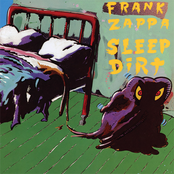Sleep Dirt

Biography
Sleep Dirt is an album by Frank Zappa released in January 1979, on his own DiscReet Records label. It reached #175 on the Billboard 200 album chart in the United States. Overview The album's creation was spurred by Warner Bros.' rejection of Zappa's Läther album. After Warner had demanded more albums than Zappa was contractually obliged to provide and had reedited the live album Zappa in New York, a lawsuit ensued, during which Studio Tan, Sleep Dirt and Orchestral Favorites were issued without...
Sleep Dirt is an album by Frank Zappa released in January 1979, on his own DiscReet Records label. It reached #175 on the Billboard 200 album chart in the United States. Overview The album's creation was spurred by Warner Bros.' rejection of Zappa's Läther album. After Warner had demanded more albums than Zappa was contractually obliged to provide and had reedited the live album Zappa in New York, a lawsuit ensued, during which Studio Tan, Sleep Dirt and Orchestral Favorites were issued without Zappa's permission. Background In early 1976, Zappa's relationship with manager and business partner Herb Cohen ended in litigation. Zappa and Cohen's company DiscReet Records was distributed by Warner Bros. Records. When Zappa asked for a reassignment of his contract from DiscReet to Warner in order to advance the possibility of doing special projects without Cohen's involvement, Warner briefly agreed. This led to the 1976 release of Zoot Allures on Warner. Early in 1977, Zappa delivered the master tapes for a quadruple-LP set, entitled Läther. However, Warner changed its position following legal action from Cohen, and refused to release the album, claiming that Zappa was contractually bound to deliver four more albums to Warner for the DiscReet label. During 1977, Zappa created the individual albums Zappa In New York, Studio Tan, Sleep Dirt and Orchestral Favorites by re-editing recordings from same batch of tapes that made up the 4-LP configuration.[3] After Warner Bros. released Zappa In New York, they told him that he still owed them four more albums. He then attempted to get a distribution deal with Phonogram Inc. to release Läther on the new Zappa Records label. This led Warner to threaten legal action, preventing the release of Läther and forcing Zappa to shelve the project. In 1978 and 1979, Warner finally decided to release the three remaining individual albums they still held, Studio Tan, Sleep Dirt and Orchestral Favorites. As Zappa had delivered the tapes only, these three individual albums were released with no musical credits.[4] Warner also commissioned sleeve art by Gary Panter, which was not approved by Zappa. When this material was first released on CD in 1991, Zappa chose to release the individual albums (along with the Panter artwork). Much of the material on Sleep Dirt was made available to the public again in a different form when the alternate version of Läther was finally officially released posthumously in 1996. Content Five of the album's seven tracks were intended for the shelved album Läther. "Flambay" and "The Ocean Is the Ultimate Solution" originally appeared in significantly shortened versions, but are presented in their original edits on the released Sleep Dirt. Zappa's intended title for the album was Hot Rats III. The change in title by Warner was also in violation of Zappa's contract. When Zappa re-issued the recordings he did not change the title. The 1979 LP version of Sleep Dirt was entirely instrumental. However, with the CD release in 1991, Zappa added new overdubs to the recordings. Zappa asked singer Thana Harris to add vocals to three songs. Zappa had originally envisioned "Flambay", "Spider of Destiny", and "Time is Money" as part of his abandoned 1972 musical, Hunchentoot, and thus, these songs were originally intended to be sung. Chad Wackerman also overdubbed drums on Flambay, Spider of Destiny and Regyptian Strut. Wackerman's parts replaced the original drum tracks. The first Barking Pumpkin CDs retained the original version of "Regyptian Strut", but this was changed for later releases. Both versions of the track can now be found on the Läther CD. Wackerman did not overdub drums on "Time is Money" even though he is credited for this in the CD notes. The 2012 Universal Music reissue reverts to the original vinyl version of the album. The creature shown on the cover is Hedorah from the 1971 Toho film Godzilla vs. Hedorah.[5] Track listing All songs written, composed and arranged by Frank Zappa.[6] Side one No.TitleLength 1."Filthy Habits"7:33 2."Flambay"5:02 3."Spider of Destiny"2:54 4."Regyptian Strut"4:15 Side two No.TitleLength 5."Time Is Money"2:52 6."Sleep Dirt"3:20 7."The Ocean Is the Ultimate Solution"13:20 Personnel Frank Zappa – guitar, percussion, keyboards, synthesizer Patrick O'Hearn – bass guitar Terry Bozzio – drums George Duke – keyboards, vocals Bruce Fowler – brass Stephen Marcussen – mastering, equalization Gary Panter – art director Dave Parlato – bass guitar Bob Stone – mastering, remastering, equalization Chester Thompson – drums Ruth Underwood – percussion, keyboards James "Bird Legs" Youman – bass guitar, rhythm guitar Thana Harris – vocals (CD remix) Chad Wackerman – drum overdubs (CD remix) Read more on Last.fm. User-contributed text is available under the Creative Commons By-SA License; additional terms may apply.


